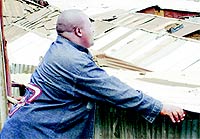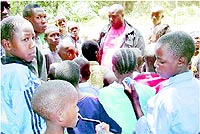 Waithaka’s
long walk to riches Waithaka’s
long walk to riches  [Nov 12,
2005]
[Nov 12,
2005]
By Eric Wamanji.
The darkness is terrifying and the chill bites to
the bone. As a family of seven cuddles up at the veranda — of what
they call home — shivering the night away, the children cry
persistently.
 |
| Mathare is home. I can’t run away from
where I was born and brought up. |
Hunger, cold, and mosquitoes have conspired to make life
unbearable.
Perhaps too young to understand, the children pester their mother
for food and blankets. But poor mother, she can only pray to God to
end the agony of being homeless.
It is a sorry sight of children infested with ringworms and lice;
and of kwashiorkor-ridden children.
If someone were to predict the future of this family, the word
"doomed," would be the first one used.
This was a while ago in the heart of Mathare Valley slum of
Nairobi. One of those crying children was David Waithaka. Thirty years
later, Waithaka is not sleeping on verandas anymore. If anything, he
is on top of things. He is the human resource manager for World Bank
in charge of 16 African countries.
Besides, Waithaka boasts of an impressive CV — two Masters from the
University of Minnesota, USA, and two undergraduate degrees from the
same college.
This places him on a plane starkly contrasting his past.
Waithaka, clawed his way from the poverty of his humble Mathare
abode, buoyed by a strong desire to free his family from the chain of
poverty, to his status today.
Curiously, though he has shrugged off the rags and grime he once
knew, Waithaka still loves Mathare.
Seventy per cent of his spare time is spent with the locals,
especially the youth.
"Mathare is home. I can’t run away from where I was born and
brought up," he says.
 |
| Waithaka loves mathare children. He has
been treating more than 100 children on a fun day at City Park. |
Today, he is a big brother in Mathare. He is a role model to many.
Aware of the difficulties besetting Mathare, Waithaka conceived the
idea of the Mathare Inspiration Centre. Here, young people are
inspired and mentored for better life. The centre has been under the
Coca Cola sponsorship for two years.
"Every time I meet young people, I see in them future lawyers,
doctors, journalists, professors … there is talent and potential in
young people, and all they need is inspiration.
We need to create in them the urge for a better life," he says.
"It is important that the young become self-confident by building
their self esteem.
That’s the best gift you can offer one … we’re the people to do it.
Most leaders ignore us, and just dismiss the slums as halls of loud
music and drunkards," he laments.
His efforts are paying off. Nick Okoth and Nick Abaka, boxers, are
products of the centre. Others are Kiss FM reporter, Henry Ndirangu,
and Dr Muchiri, a distinguished clinician in Kijabe. Many children are
also thronging to school.
"The world should be aware that people live in Mathare. People here
need hospitals. I’ve seen many patients dying here at Juja Road for
lack of transport to Kenyatta National Hospital.
There are no schools here. Water is more expensive here than
elsewhere.
And nothing is more embarrassing than a child going for a call of
nature at the riverside only to meet the parent there doing the same
thing.
Born 38 years ago in Bondeni village, Waithaka, popularly known as
Davy, attended Dr Aggrey Primary School in Pumwani. "There were no
primary schools in Mathare," he says.
But during his formative years, Waithaka forged a strong relation
with the church and the bible. He participated in choirs and other
church activities.
"After my CPE, I joined Lang’ata High School. At that time, it was
a simple tin structure near Wilson Airport. For two of the four years,
I walked so I could save Sh2 for lunch." And in what would shame the
past, today Waithaka has four passports to his name, and has been to
most parts of the world.
Passing with Division One, he was enrolled at Parklands High School
for ‘A’ levels. This was another stressing moment. I didn’t have
school fees. Luckily for Waithaka, when he was just about to lose
hope, a friend from the local church got wind of his plight.
"He paid my school fees, books and hostels. It was a miracle I will
never forget," he remembers.
"Though I was admitted in a local public university, a friend at
the church invited me to study in America — taking African studies and
international relations.
When I came back in the early 1990s, there were no jobs. I went
back to the US on a scholarship. I did an MA in public affairs and
human resource management."
Memories of the poverty he lived in are still fresh.
"We were poor. We used to get food from neighbours, and at one time
we were homeless. We spent many nights on cold verandas. I never knew
my father, and all the responsibilities of the family were my mother’s
burden," he recalls.
Waithaka, who is the third-born in a family of seven, still regrets
the death of his mother in 1994.
"She meant a lot to me. She inspired me. And I always worked hard
to ensure that she didn’t live in poverty anymore," he says.
Waithaka knows just too well where to find wisdom and success — the
Bible. Since his teenage days, he says, he fell in love with
Christianity and has not let the verve dwindle.
"I’m not what I am by accident. It is the will of God. When you
work for God, He will never forget you," says the man who finds solace
and strength in the bible.
"Since the world is plagued with inequalities, selfishness and
tyrannies, the Bible remains the path of the righteous man," he
maintains.
"Blessed is the man who shepherds the weak through the valley of
darkness, and finder of lost children. He is truly his brother’s
keeper," Waithaka says of the philosophy that keeps him going.
And talking about the Bible, he understands just too well the
predicament of the young in religion.
"I set up the Teen Challenge. This is a worship centre for the
young people who are not comfortable worshipping with adults. If we
don’t do this, we’ll be courting trouble. Any society that doesn’t
know God is hollow," says the man who preaches every Sunday to slum
people.
On this particular Sunday, we met him on his way to preach in
Embakasi.
And characteristic of a man brought up in the ghetto, sheng is his
lingua franca and he "enjoys speaking it."
Slums, says Waithaka, can be dangerous. While he looks back to the
paths he treaded and sees the wonders of God, Waithaka feels sorry for
his age mates.
Today those alive are nothing but hopeless.
"One needs the grace of God to come out of here. Slums are good at
wrecking people. My peers are no more..."
Waithaka believes in serving others. One thing he cherishes most
from America is philanthropy. A Mr Myers, a missionary in the US,
taught him this.
Apart from soccer where he is an ardent fan of Liverpool FC,
Waithaka also enjoys playing the guitar.
He treasures the time spent with his three children where he
instills in them "the values and virtues of becoming truly human."
While attending Sunday school, playing the guitar and keyboard, he
fell in love with Nancy. And this love blossomed to a "happy
marriage."
Nancy is the daughter of Bishop Arthur Gitonga of the Redeemed
Churches. Nevertheless, there are several things that are seemingly
sacred. One of them is his job at World Bank, and his family.
He maintains though, "If I wanted to live in Muthaiga I would. But
I live in a humble abode in Kikuyu. My wish is to see every child from
the slum is educated."
True, unlike many people, he did not rush to buy a car. Instead, he
focused on supporting slum children and the youth.
"I love the BMW. But, I only bought it the other day."
Instructively, the car is a second hand, a 1988 model.
"But I’m comfortable with it. Satisfaction does not come from
materials; it comes from values," he says.
Still he tells us that Nancy, who works at the Central Bank of
Kenya, is a music enthusiast, and features prominently on Family TV.
He has three daughters Vicky, Ciku and Ciru. He also adopted his
sister’s daughter, bringing the number of children to six.
Apart from his own family, Waithaka loves Mathare children. On Moi
Day, when we caught up with him again, he was treating more than 100
children on a fun-day at City Park.
"These children need love and encouragement. They need guidance.
They need enjoyment just like any other. This fun-day is to get them
out of the slum. Some of them have never been to City Park," he
explains.
Humble. Yes, for Waithaka played with children all the games —
including skipping rope, kati and hide and seek.
"I miss my childhood. It may have been deperate but, it was fun
too," he said.
Taking us back in time, the man who calls the shots on the World
Bank staff, romanticises his past. Many were the days he went out
hunting with his gang of local youth known as Gerry. Many are the days
they went out in the evenings to watch the outdoor films like Tazama.
Many were the days he went out swimming in Nairobi River. Many were
the days they played football. And many were the days he had
satisfaction and great fun. All those remain memories, rich memories.
The local youth consider him an emancipator from the assault of
harsh slum currents.
"We look at him as our brother because he listens to us. He has
also helped many people to go abroad for studies. Few people would do
that," says Mr Peter Okonji, one of the young people of Mathare.
Today, Waithaka is helping the community to build toilets. Apart
from spiritual nourishment, the Mathare Association has also helped
locals to form sporting teams. Orphans, widows and people living with
Aids have a shoulder to lean on. Small wonder then that he is seen
here as a leader.
"We want him to contest for a political seat, but he is reluctant,"
they say.
And Waithaka’s eyes are not set on politics either. "No politics. I
can serve people well away from bunge. Let’s talk development..."
Before joining the World Bank in 1999, Waithaka worked in Georgia,
US, with Coca Cola for six months.
The company then transferred him to East Africa as human resource
manager — operations in 1996.
Waithaka believes in four pillars for happiness:
"Respect to God. Respect to family. Respect to friends. Develop
your society, starting with your own neighborhood. This way, the world
becomes a better place to live in … and I have a dream. A dream to see
the slum people delivered from ‘Egypt’."
Article source East African Standard Newspaper.
East African Standard Newspaper.


|
![]() COMMENTS
| PHOTOS
|
EVENTS |
COMMENTS
| PHOTOS
|
EVENTS |![]() MIXOLOGY
MIXOLOGY![]() |
|![]() VIDEOS |
ARTICLES
VIDEOS |
ARTICLES
![]()
![]() |
CONTACT
|
LOGIN
|
CONTACT
|
LOGIN
![]() |
REGISTER
|
REGISTER
![]()
![]()
![]()
![]()
![]()
![]()
![]()
![]()
![]()
![]()






